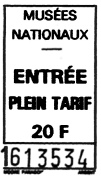8.3: Indirect object pronouns and imperative construction.
- Page ID
- 142321
Réponses Rapides
F. Indirect object pronouns and imperative construction.
- Parlez-moi d'amour! (lui, nous, leur)
- Rendons-lui les devoirs! (leur)
- Dis-lui la vérité! (moi, nous, leur)
- Ne me téléphonez pas! (nous, lui, leur)
- Ne nous racontez pas d'histoires! (me, lui, leur)
Grammar Notes: You've encountered command/request forms before. In this section we take up all of them, so we recommend that you review the discussion of the imperative mood in the Reference Grammar, 7.2, before going on to the following exercises.

Exercice IV
Change the following commands to the negative, following the model.
Modèle: Donnez-moi un stylo!
Ne me donnez pas de stylo!*
- Expliquez-lui le problème!
- Fermez la porte!
- Dis-lui qu'il est méchant!
- Racontez-nous l'anecdote!
- Faisons nos devoirs!
- Parle français!
- Fais la vache!
- Fais le cheval!
* Do not forget, when negated, indefinite article and partitive constructions become de, Reference Grammar, 2.2.3, b, Note 3).
Exercice V
Tell the person designated to do (not to do) what is mentioned in the following sentences. Use the vous-form, tu-form, or nous-form as appropriate. (Note that the form is determined by who you are and whom you are addressing, not by the form we use in the "Dites à..." instructions.)
Modele: Dites à votre ami de vous téléphoner à 6h.
Téléphone-moi à six heures.
- Dites à votre ami de vous donner un coup de til à 8h.
- Dites à votre prof de vous rendre vos devoirs (SVP).
- Dites à votre camarade de chambre de ne pas fermer la fenêtre.
- Vous êtes dans une banque et vous touchez un chêque. Dites à la caissière de vous donner des billets de 50 francs.
- Dites à votre ami de ne pas vous chanter cette chanson.
- Vous êtes le prof. Dites à vos étudiants de vous montrer leurs cahiers d'exercices.


OUVRIR, to open OFFRIR, to offer, give (a gift)
| J'ouvre mon livre pour étudier. | I open my book to study. |
| Tu lui offres ta voiture? | Are you giving him your car? |
| Elle ouvre les yeux. | She is opening her eyes. |
| Nous ouvrons nos cadeaux. | We open our gifts. |
| Vous ouvrez la fenêtre. | You open the window. |
| Ils m'offrent 10.000 dollars. | They are offering me 10,000 dollars. |
| Passé composé: j'ai ouvert, ...; j'ai offert, ... | |
| Imparfait: j'ouvrais, ... | |
| Futur: j'ouvrirai, ... | Futur proche: je vais ouvrir, ... |
Exercice VI
Prepare a short statement (five or six simple sentences) in which you mention specific items that someone gave you recently. Invent or recall a reason for the giving (birthday, graduation, and so on) and be imaginative about the items you received. You may use an English to French dictionary for a wider choice of items, but keep it simple.
Then prepare a statement to explain what you are going to give that person on his or her birthday (for example).

